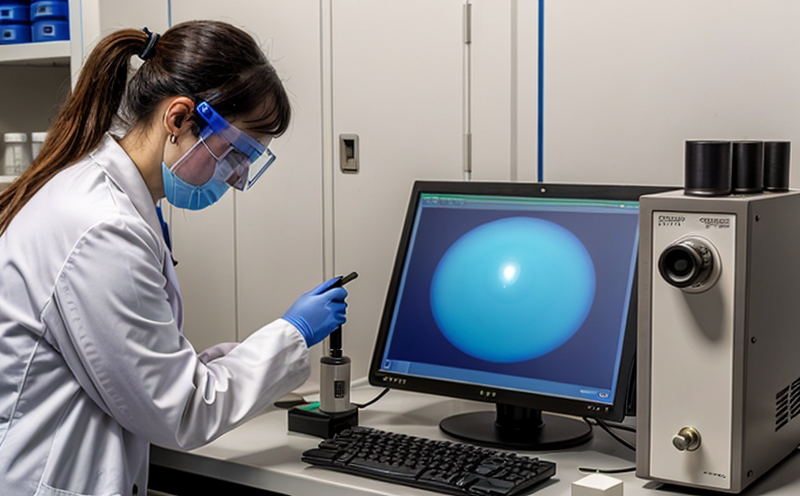CFR 40 Spectroscopic Testing of Environmental Samples
The Comprehensive Environmental Response, Compensation, and Liability Act (CERCLA) under Title IV of Public Law 96-510, known as the Superfund Amendments and Reauthorization Act of 1986, is codified in CFR 40. This regulation deals with various aspects of environmental safety and pollution control. One critical component of compliance involves spectroscopic testing for hazardous substances present in environmental samples.
Spectroscopy plays a pivotal role in identifying compounds within complex mixtures by measuring their interaction with electromagnetic radiation. For CFR 40-mandated tests, the primary goal is to accurately quantify and identify trace elements or organic contaminants that may pose risks to human health and the environment.
The choice of spectroscopic method depends on the nature of the sample and target analytes. Common techniques include Inductively Coupled Plasma Mass Spectrometry (ICP-MS), Infrared Spectroscopy (IR), and Ultraviolet–Visible Spectroscopy (UV-VIS). Each technique has its strengths; for instance, ICP-MS offers high sensitivity and low detection limits suitable for trace metals in environmental matrices. IR can provide structural information about organic compounds, while UV-VIS is effective for determining the concentration of specific chemical species.
Sample preparation is a critical step before spectroscopic analysis. Environmental samples such as soil, water, or air require thorough pretreatment to ensure accurate results. This might involve digestion using acids like nitric acid in the case of solid matrices, filtration for particulate removal, and dilution if concentrations are too high.
The analysis process involves several stages: calibration, sample introduction, data acquisition, and interpretation. Calibration ensures that instrument responses correspond accurately to known concentrations of reference standards. Sample introduction techniques vary based on the type of spectroscopy used but typically involve direct injection or nebulization in ICP-MS setups.
Data interpretation requires expertise since it involves identifying peaks or spectra corresponding to specific elements or molecules and comparing them against established standards provided by organizations like ISO, ASTM, EPA, or other recognized bodies. Results must meet stringent thresholds outlined in CFR 40, ensuring that any detected levels of hazardous substances do not exceed permissible limits.
The importance of this testing cannot be overstated given its direct impact on public health and ecosystem protection. By adhering to these regulations, industries can demonstrate their commitment to sustainability while also protecting themselves against potential liability issues associated with non-compliance.
Eurolab Advantages
EuroLab prides itself on providing comprehensive spectroscopic testing services tailored specifically for CFR 40 compliance. Our team of experienced scientists and engineers ensures that all samples are handled with utmost care, employing best practices throughout the entire analytical process.
- State-of-the-Art Equipment: We utilize advanced instrumentation such as high-resolution ICP-MS, Fourier Transform Infrared Spectrometers (FTIR), and UV-VIS spectrophotometers to deliver precise measurements.
- Expertise: Our staff includes professionals who are well-versed in both the scientific principles behind spectroscopy and regulatory requirements under CFR 40.
- Comprehensive Reporting: All reports include detailed descriptions of analytical methods, raw data, calculations, and conclusions compliant with relevant international standards.
- Turnaround Time: We understand the urgency of these tests; thus, we strive to provide results within industry-standard timelines without compromising accuracy.
- Customer Support: Our dedicated customer service team is always available to assist clients with any inquiries regarding our services or interpreting their test outcomes.
EuroLab's commitment to excellence sets us apart as a leader in CFR 40-compliant spectroscopic testing. By choosing us, you gain access not just to cutting-edge technology but also to unwavering dedication towards ensuring the highest standards of quality and reliability.
Quality and Reliability Assurance
EuroLab maintains strict quality control measures to ensure that every test conducted adheres strictly to CFR 40 specifications. These include rigorous internal audits, proficiency testing programs accredited by recognized bodies like A2LA or ISO/IEC 17025.
We employ stringent quality assurance protocols at each stage of the analytical process—from sample receipt through final report generation. This includes cross-checking results using multiple instruments and methods whenever possible to minimize errors.
Our laboratories adhere strictly to Good Laboratory Practices (GLPs) which mandate adherence to standard operating procedures, documentation practices, and recordkeeping requirements designed to ensure reproducibility of analytical data.
Furthermore, we participate actively in proficiency testing programs organized by authorities such as the United States Environmental Protection Agency (EPA), European Union Reference Laboratories for Materials Analysis, or other similar entities worldwide. Participation in these programs allows us to benchmark our performance against peers globally and identify areas for improvement continuously.
Competitive Advantage and Market Impact
EuroLab's ability to offer precise CFR 40-compliant spectroscopic testing gives companies a significant competitive edge. In today’s highly regulated market, compliance is not just advisable—it’s essential.
By partnering with EuroLab, businesses can ensure that their operations meet all necessary requirements set forth by regulatory bodies like the EPA or other relevant agencies. This not only mitigates risks associated with non-compliance but also enhances corporate reputation and trustworthiness among stakeholders including customers, investors, and regulators themselves.
In addition to aiding in meeting legal obligations, these tests play a crucial role in driving innovation within R&D departments by providing valuable insights into environmental impacts of new products or processes. This information can then be used strategically to develop more sustainable solutions that meet both regulatory requirements and market demands simultaneously.
The reputation built around EuroLab's reliability extends far beyond immediate compliance needs; it fosters long-term relationships based on mutual respect, trust, and shared goals. As a result, our clients enjoy enhanced standing in their respective industries while contributing positively towards environmental stewardship efforts globally.





